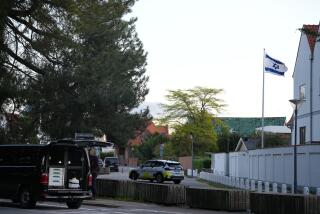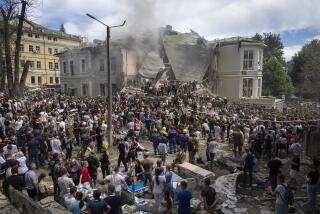Grenade Hits U.S. Moscow Embassy : Russia: No one is hurt as photocopying machine absorbs blast. With no claim of responsibility, suspicion falls on opponents of NATO air strikes or mafia circles.
- Share via
MOSCOW — A rocket-propelled grenade fired across the busy Garden Ring Road at rush hour Wednesday blasted into the sixth floor of the U.S. Embassy in an attack by unknown assailants.
No one was injured by the grenade that struck the stone exterior of the stately yellow-and-white building at 4:25 p.m., embassy spokeswoman Olivia Hilton said. The blast was absorbed by a large photocopying machine that shielded much of the interior from flying glass and fragments, she said.
There was no immediate claim of responsibility for the attack or explanation of what provoked it.
Russia’s Independent Television newscast said the single, rocket-propelled grenade was probably fired by political extremists angered by the U.S.-led NATO air strikes against Russia’s Bosnian Serb allies in the Balkans.
But speculation also centered on Moscow’s powerful mafia circles, with the U.S. Federal Bureau of Investigation a potential target of retaliation for its raids on a major Russian Armenian criminal ring in Southern California on Tuesday. The type of grenade launcher used in the attack is known to be readily available to crime syndicates in Russia.
Police found the grenade launcher with army markings in an archway across the 12-lane Garden Ring Road about half an hour after the blast, the embassy reported in a statement. Also found were a black full-face mask, a glove and a paper bag that investigators believe was used to carry the weapon to the scene.
There had been no prior warning of the attack, Hilton said.
Windows were shattered on the fifth and sixth floors of the building near the soot-smudged point of impact, and glass and fragments of shell casing littered the sidewalk in front of the embassy.
A shattered street light above the spot where the grenade launcher was found suggested that the round first struck the light standard, possibly causing the grenade to go slightly astray from its target. The crater marking the point of impact was about a foot away from a window, and embassy employees said the damage probably would have been considerably greater had the grenade penetrated the glass instead of the stone facade.
All occupants of the embassy were evacuated immediately after the explosion. The embassy is among the U.S. government’s largest foreign missions, with more than 950 U.S. and Russian employees.
U.S. Ambassador Thomas Pickering was in Washington on annual leave, and no employees were in the copying room at the time of the detonation, Hilton said.
Although Russian and U.S. officials said an investigation was continuing, the Itar-Tass news service quoted Russian law enforcement officials as saying the lone attacker “has escaped.”
In Washington, the White House and the State Department condemned the attack--which came at a time of strained relations between Russia and the United States--and quickly absolved the Russian government of responsibility.
“Obviously, we condemn this attack on a U.S. diplomatic facility, but we will work together with the Russian authorities to determine what we can find out very quickly about the nature of the attack,” White House Press Secretary Mike McCurry said.
State Department spokesman Nicholas Burns added: “We have received this morning, following the grenade attack, very good, in fact, I would say, excellent cooperation from the law enforcement agencies in Russia. And we fully expect that that will continue.”
Interior Ministry troops and Russian Federal Security Service agents were deployed to bolster security at the embassy in response to the attack and as a precaution ahead of today’s visit to Moscow by U.S. Deputy Secretary of State Strobe Talbott.
The Interfax news agency said that as a consequence of the incident, Russian police were also reinforcing security at U.S. consulates in St. Petersburg, Yekaterinburg and in the far eastern port of Vladivostok.
“There are always things that you can do to enhance security,” Burns said in Washington. “You can restrict the movement of certain people; you can do all sorts of things.”
He declined to list specific steps being taken.
Burns said there is no reason to believe that the attack was provoked by Russia’s criticism of North Atlantic Treaty Organization bombings in Bosnia-Herzegovina.
“I don’t believe that anything that was said publicly in the last few days would compel or convince any individual to do what someone did . . . at the American Embassy in Moscow,” Burns said.
Burns said of the terrorists: “Either they have a political ax to grind--which is clearly not the political agenda of the Russian government--or they’re sick. And it may be a combination of the two.”
The embassy in Moscow has been the target of several recent bomb incidents, including hoaxes. An explosive device was found in a kiosk near the mission two weeks ago, and at least one explosion of undetermined origin occurred outside the facility last year.
Such terrorist incidents were extremely rare during the Communist era, when access to weapons and explosives was closely controlled by the government and KGB security forces. But attacks on businesses, banks and foreign representations have become almost commonplace in the tumultuous age of unregulated arms trading and grossly deteriorated law enforcement.
Burns said there are no plans at present to urge Americans to avoid travel in Russia as a result of the attack.
“American citizens should take the normal precautions that they ought to take in any major European or North American city, but I’m not announcing any additional travel warnings to American citizens,” he said.
Times staff writer Norman Kempster in Washington contributed to this report.
More to Read
Sign up for Essential California
The most important California stories and recommendations in your inbox every morning.
You may occasionally receive promotional content from the Los Angeles Times.














